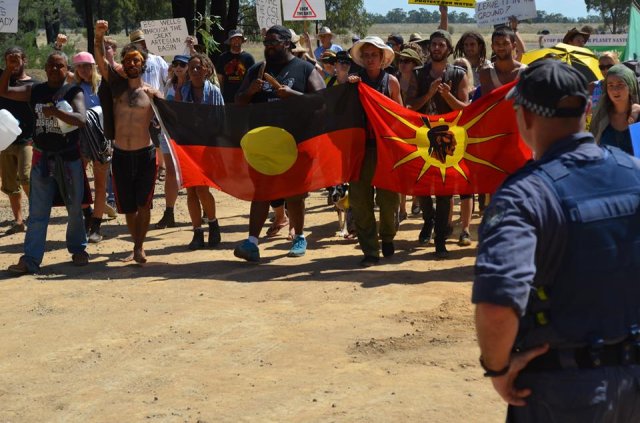
We arrived at twilight and put up our tents using the headlights from the car. A young man at the camp helped us with threading those damned rods with elastic bits through the tape slots on the tent. We had just got it up when we heard a bell ring for the evening meal. The meal was delicious, catering for both vegetarians and meat eaters.
The camp is the Pilliga Push protest camp at Coonabarabran in the Pilliga Forest. Our impression was that the camp was extremely well run and organised. It had hot showers, toilets, a large first aid tent and a huge well-stocked kitchen, which had a large fire with constant hot water for tea and coffee and a barbeque.
There was a huge tent with lots of lounge chairs where discussions were held and a tent set aside for making art work, banners and posters. There was also a caravan set aside for the Knitting Nanas, whenever they came to stay. The camp was powered by solar panels with a place for powering up mobile phones and music of course. It was all truly amazing.
The camp was set up in November, when the gas giant Santos, which had been inactive for 18 months, resumed drilling coal seam gas (CSG) wells in the Pilliga. The aim of the camp is to stop Santos drilling its planned 850 wells in the forest.
The Pilliga is the largest remnant of semi-arid, temperate, eucalyptus woodland in the state, with groundwater experts expressing great concern about the contamination and pollution of the Great Artesian Basin. Santos is drilling through three basins, the Murray-Darling Basin on top, the Surat Basin, below which is dead water, and the Gundagai Basin, the deepest, where Santos is after the methane in the coal seam.
This is the largest, oldest and deepest Artesian Basin in the world. It covers a quarter of Australia and may even extend into Papua New Guinea. As farmer Anne Kennedy said: “It is Jurassic water. The Pilliga is a recharge area for the Basin. This is the greatest resource Australia has.”
The struggle is all about the destruction of the clean water supply, which is essential for agriculture, farming and simply sustaining life for plants, animals and humans.
Dan and Tania, who initially set up the camp, told us that there had been 50 arrests and more than 350 stoppages of work on the drill sites since November. In the past few months, people have been fined $450 for trespassing on the National Park.
The police have been brutal, issuing $350 fines for one small bald patch on a spare tyre, crossing over a double line to get to an evacuation camp during the January bush fires, deregistration of cars, suspension of driving licences and any other minor infringements they can dream up.
In January, three fires were deliberately lit on each side of the camp. The sandstone caves with ancient engravings, an Aboriginal sacred site, were deliberately burnt out last month. The pressure has come down the line, from Santos and the Baird Coalition government, down to the local council and police.
The camp to fight this abomination has brought together farmers, environmentalists, students, teachers and Aboriginal families. The camp has been host to Aboriginal ceremonies, emphasising cultural heritage values. They also found significant, ancient grinding stones on the camp site from much earlier occupations.
The camp has had, at times, more than 200 people staying and many others have donated batteries, mattresses, tents, equipment and money. As one local told me, the most important change has been the coming together of farmers and environmentalists.
Santos says it is only exploring for gas. It does not pay tax on exploratory mining but clearly they are already extracting gas. Santos's share price has plunged 41% in the past 12 months as it battles sliding energy prices and heavy debt levels.
Santos was responsible for the bankruptcy of a Queensland company, Lean Field Development. It owed $9.6 million for the completion of Central Queensland gas pipelines but did not pay up.
It has been a troubled year for Santos: its net loss was about $2.7 billion in 2015, from a $935 million deficit a year earlier. The continuing decline in oil prices means its share price keeps diving. Credit Suisse said it is not expecting 2016 to look any better for Santos, forecasting an underlying loss for Santos of $98 million.
In November, the company opted against breaking up and instead said it would raise $3.5 billion in new capital and sell a gas field for $520 million. It is not known which one. It had earlier rejected a $7.4 billion bid from a Bermuda-based private equity firm. There are rumours that Santos would like to sell the exploration licence for Pilliga but can't find a buyer.
According to the Wilderness Society, the first 92 exploration gas wells have destroyed 200 hectares of forest through clearing and there are creeping kill zones caused by toxic spills and salty brine. Drilling activities have heavily fragmented at least 1700 hectares of forest. High salinity, heavy metal and petrochemical pollution events are ongoing, and wildlife has been found dead in many of the toxic drill ponds. Santos has been fined for uranium and heavy metal contamination of groundwater aquifers in the region.
Unfortunately the camp has to close. It was on private land but pressure has been applied to the landowner over zoning restrictions. It has taken a few months for the council to sort out the legalities. It was a really sad ending to our wonderful stay. But the fight will continue in another form. We won at Bentley and we won at Gloucester. We won't lose the Pilliga.
Like the article? Subscribe to Green Left now! You can also like us on Facebook and follow us on Twitter.